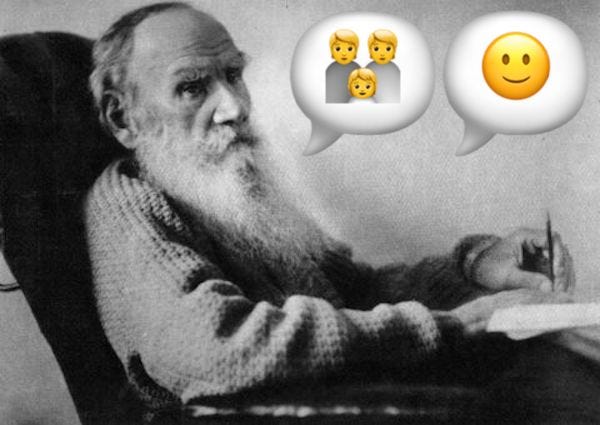
“All happy families are alike; each unhappy family is unhappy in its own way.”
— Leo Tolstoy
As we prepare to gather around the conifer, menorah, and unadorned aluminum pole, consider the opening lines of Anna Karenina. Is your family happy or unhappy, and if so, how?
The aphorism came to mind thanks to this essay by Colin McGinn (found via The Browser), in which the philosopher admits that it “rings true” and sets out to explain why.
“Is it that my happiness resembles your happiness but that my unhappiness is unique to me? But surely I can be happy in virtue of something that doesn’t make you happy (e.g. being a kite surfer) and also unhappy about the same thing you are unhappy about (e.g. being short of funds). Whence the asymmetry?”
He ultimately concludes that it’s a supply-and-demand problem. Most of the world makes most of us unhappy. The few good things — hygge, gingerbread, clever newsletters — are those we all agree upon. “There are not many things in this world to be thankful for,” McGinn writes. “but of things to complain about there is no end.”
This is an admirable attempt to square Tolstoy’s circle, but I think the problem is with the line itself. Because:
“A witty saying proves nothing.”
— Voltaire
And:
“Do not do unto others as you would expect they should do unto you. Their tastes may not be the same.”
— George Bernard Shaw
Ultimately, Tolstoy flubbed the dub. I owe that insight to Robert Fulford, the Canadian critic I had the honour of editing for about a decade. In this terrific 2005 column, he called it “the silliest damn sentence ever set down by a great author.”
Why?
He got things backwards. Experience and literature both demonstrate that happy families come in all shapes and sizes, but the burdens of unhappy families (emotional indifference, poverty, alcoholism, irresponsibility) are painfully predictable.
What was Tolstoy saying? Perhaps, focusing on an unhappy family, he was hoping that he had chosen the more interesting kind. An English critic, Robert Winder, argues that “all he really meant was that happy families are a fat lot of good to a man planning an 800-page novel.” Tolstoy’s words have the sound but not the substance of truth. Still, they launch a great book.
A lovely reader requested a holiday edition of Get Wit Quick that was both warm and witty. I hope this fits the bill, and that no matter what shape and size your family comes in, no one gets bludgeoned with a festivus pole.
Quick quips; lightning
“The reason grandparents and grandchildren get along so well is that they have a common enemy.”
— Sam Levenson (1911-1980)
Classic Borscht Belt line from the first comedian to be roasted at the New York Friars’ Club — more on that phenomenon back in Issue No. 5.
“After a good dinner one can forgive anybody, even one’s own relations.”
— Oscar Wilde (1854-1900)
Which means there’s no hope if you overcook the turkey.
“If you cannot get rid of the family skeleton, you may as well make it dance.”
—George Bernard Shaw (1856-1950)
This assumes you only have the one. Shaw wrote this in 1930; the year before, Walt Disney directed this Silly Symphonies animated short called The Skeleton Dance.
That’s the 25th issue of Get Wit Quick, a family-friendly read for unfriendly kitesurfing families. Elements of Wit: Mastering The Art of Being Interesting was mockingly dedicated to my children, a joke borrowed from The Master. Spread cheer by tapping the ❤️ below, and offer the free gift of this newsletter to your nearest and dearest.



